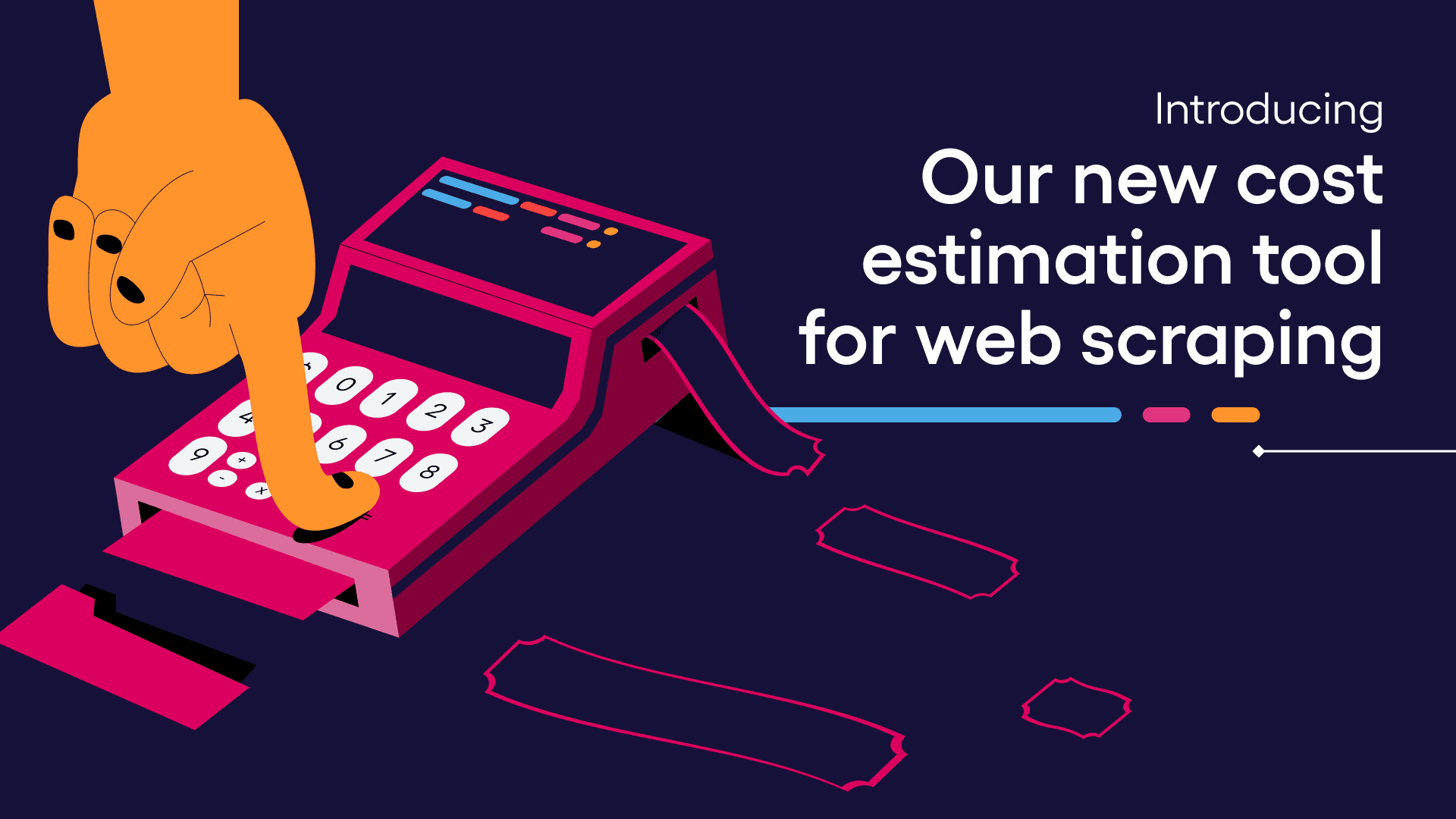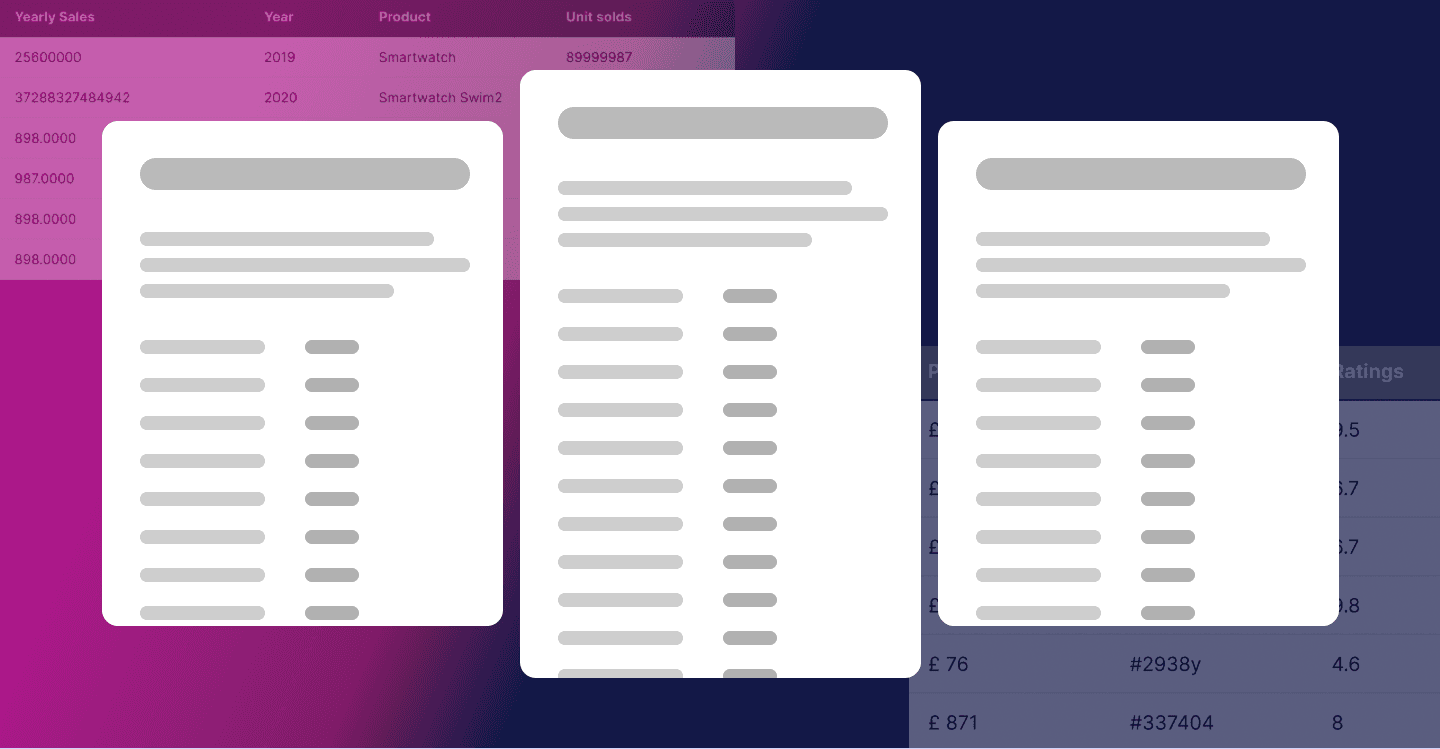How to make sure your project costs don’t get out of control
Cost is often a key deciding factor in web extraction, making the project cost estimation process essential when exploring a new data feed or expanding an existing one.
Estimating costs is challenging due to the dynamic nature of the web and the numerous factors involved in web scraping projects. Even small projects may require a broad set of tools, such as headless browsers, website unblocking techniques, and data quality monitoring systems, to prove ROI promptly.
However, choosing the right technology can eliminate much of this struggle and save a lot of development time.
Web scraping APIs simplify budgeting by bundling the necessary tools into a single request, empowering data teams to streamline their financial planning.
Here’s how web scraping APIs do it.
Understanding the cost variables in web scraping
As seasoned professionals can confirm, several interrelated variables impact web scraping project costs.
These variables can be divided into four categories: setup, unblocking, computing, and maintenance.
Setup costs include time spent analyzing websites and developing scrapers for data extraction. It also encompasses structuring data collection infrastructure, such as databases and monitoring systems, to ensure the project meets its objectives efficiently.
Unblocking costs: Proxy rentals are essential for accessing different websites. Simple websites might only require basic proxies, while more complex ones demand specialized solutions like residential or mobile proxies, accompanied by delicate session-management techniques.
Compute costs: This covers the computing resources needed for scraper operations, including servers, virtual machines, and storage. The frequency and speed of the scraper runs affect the overall computing cost, especially when dealing with dynamic content.
Maintenance costs: Maintenance is necessary for scraper updates and fixing issues as websites evolve. Managing vendor subscriptions and overseeing the data quality monitoring system are also components of this cost.
Let's now look at the three main factors influencing each cost category: anti-bot website protection levels, project scope and website complexity and how they impact cost estimation?
Website protection level
The more sophisticated a website’s anti-bot measures, the more advanced the scraping technology must be, impacting the cost structure.
A good way to correlate website difficulty to the necessary technology is using Zyte's 5-tier approach. Zyte categorizes websites into five tiers based on their complexity, either to estimate data extraction costs for customers or the website unblocking costs of Zyte API for users:
Tier 1: Basic websites that can be unblocked using simple data center proxies.
Tier 2: Sites with stronger anti-bot measures, requiring data center proxies and additional compute power.
Tier 3: These websites generally need data center proxies but may also require residential proxies for session management.
Tier 4: Sites in this tier necessitate residential proxies and browser rendering.
Tier 5: The most complex websites demanding residential proxies, heavy browser rendering, extensive computing, and potentially geo-located proxies.
These tiers provide a structured way to anticipate the technology stack needed for each website, helping teams avoid over-provisioning resources.
Project scope: how much data, how often, and from where
Project scope determines the scale of web scraping, from the amount of data required to the frequency of data retrieval.
More extensive projects involving complex interactions, such as searches or image capture, will require more computing power and storage solutions.
Here are a few ways scope can impact costs:
Data volume: High data volumes increase storage needs. Frequent updates, such as daily data pulls, may require systems to override previous datasets to save on storage.
Quality assurance: Larger data projects often require comprehensive quality assurance, and expanded scopes may need scraping entire websites to capture potential future requirements, increasing operational costs.
Website complexity and scraper development
Websites with dynamic or frequently changing content require more setup and maintenance to ensure reliable data extraction.
Dynamic sites may redirect URLs or add or change pages frequently, impacting both compute costs and maintenance demands. Scraper development for these sites requires detailed monitoring and adjustment, particularly if the site adds or changes features that interfere with the automated data retrieval process.
Zyte’s Web Scraping API: a new approach to web scraping cost management
Traditional web scraping approaches demand substantial resources to set up proxies, manage headless browsers, and build data extraction systems.
Each component—proxy management, browser configuration, and data storage—adds costs and requires continuous maintenance as websites evolve.
Zyte’s Web Scraping API simplifies this by bundling all essential tools into a single API, automating proxy selection, browser rendering, and unblocking processes.
This streamlined approach reduces the need for internal infrastructure. It automatically adapts to each website’s complexity and allocates only the necessary resources for each request.
With Zyte API, companies no longer need to build or maintain custom setups. They also don’t need to provision servers, configure proxy pools, or constantly monitor and troubleshoot as websites adjust their anti-scraping measures.
The savings can be huge for high-scale web scraping projects.
If cost reduction is a priority for you, here’s how web scraping APIs can help:
Reduced infrastructure costs: APIs can eliminate the need for separate proxy services, headless browsers, and manual scraper setup.
Dynamic resource allocation: Resources are automatically allocated based on website complexity, preventing cost wastage.
Simplified maintenance: With a system that adapts to site changes, APIs minimize maintenance by automatically handling updates to anti-scraping measures.
By consolidating multiple tools into a single, comprehensive API, Zyte provides transparent, predictable pricing. These efficiencies are substantial for businesses scraping data at scale, saving time and resources by reducing infrastructure tweaks and troubleshooting.
Let's run 3 typical scenarios in which the cost structure will change the most to see how impactful web scraping APIs can be on costs.
Scenario 1: Simple crawls on unprotected websites
For unprotected websites with minimal anti-bot defenses, traditional approaches involve basic setup and proxy subscriptions.
Zyte API simplifies this by automating proxy configuration and monitoring, reducing the need for extensive setup or frequent maintenance.
Setup
• Scraper setup, database setup, monitoring system.
• Trial-and-error anti-ban strategy.
Minimal setup, reduced further with AI Scraping.
Unblocking
• Data center proxies.
• Estimating costs is hard.
• Per-website automatic unblocking.
• Costs are known upfront.
Compute
Basic computing configuration.
Included in request cost.
Maintenance
• Basic scraper maintenance and vendor management.
• Spend time fixing parsing code when it breaks.
• Spend time redoing your trial-and-error anti-ban work when it breaks.
• Minimal maintenance due to API resources.
• Automated.
Scenario 2: Simple crawls on protected websites
Protected sites often require additional resources, like residential proxies, to avoid bans. With Zyte API, unblocking is automatically managed without manual session or cookie controls, reducing the complexity and cost of handling protected sites.
Setup
Setup with monitoring, additional proxy sessions.
Minimal setup, fully automated proxy management.
Unblocking
Datacenter and residential proxies with session management.
API-automated unblocking with built-in session handling.
Compute
Enhanced computing for browser rendering.
Included in request cost.
Maintenance
Ongoing scraper re-writing and proxy vendor management
Minimal maintenance with API-managed site adaptation.
Scenario 3: High-volume crawls on complex websites
Traditional methods require robust infrastructure and extensive proxy and compute resources for high-volume crawls, especially on complex sites with high security. Zyte API automates this entire process, significantly reducing setup and operational costs.
Setup
Extensive scraper setup, database setup, and monitoring.
Minimal setup due to API resources.
Unblocking
Residential or geo-located proxies, complex browser rendering.
Fully automated by the API, with hosted headless browsers deployed per request.
Compute
High computing for complex scrapers and headless browser operations.
Included in request cost.
Maintenance
Heavy maintenance of scrapers and proxy management.
Minimal maintenance, reduced with AI Scraping.
Estimate any website’s data extraction cost easily with our new tool

With our new cost estimation tool, estimating the cost of any web scraping project has never been easier. Simply input the website, and our tool will do the rest—calculating the proxy, computing, and any other costs required to extract the data you need successfully.
Ready to try it? Visit our platform and start estimating your next project with confidence.
FAQ
What makes cost estimation for web scraping projects challenging?
Estimating costs can be tough because of the dynamic nature of the web and the various tools often required for a web scraping project—like headless browsers, proxy unblocking, and data quality monitoring. Even small projects may need these resources, making budgeting essential but complex.
How do web scraping APIs help control project costs?
Web scraping APIs combine essential scraping tools into a single request, making it easier to budget accurately. They streamline financial planning by bundling infrastructure like proxies and computing resources, reducing the need for multiple vendors and setup processes.
What are the primary cost factors in web scraping projects?
Key cost factors in web scraping include setup, unblocking, computing, maintenance, and legal compliance. Each factor can vary widely depending on the project scope, website protection levels, and complexity.
How does website protection level affect costs?
Websites with advanced anti-bot protections require more sophisticated scraping technology, increasing costs. Zyte classifies websites into five tiers, from basic sites needing only data center proxies to highly complex sites that require residential proxies, headless browsers, and geo-targeted proxies.
How does the scope of a project impact costs?
Scope affects costs in terms of data volume, update frequency, and quality assurance requirements. For instance, larger projects with frequent data pulls demand more computing power, storage, and monitoring, leading to higher operational costs.
What is Zyte’s Web Scraping API, and how does it reduce costs?
Zyte’s Web Scraping API combines proxy management, browser rendering, and unblocking into one API, automating the process based on each website’s requirements. This minimizes the need for internal infrastructure and lowers maintenance costs by automatically adapting to website changes.
How can I estimate web scraping costs for specific websites?
With Zyte’s new cost estimator tool, you can input a website, and the tool will calculate proxy, computing, and any additional costs required for data extraction. This feature simplifies budgeting and provides a transparent cost breakdown.
What maintenance benefits does the API provide?
Zyte API automatically adjusts to anti-bot changes on websites, reducing the need for continuous manual updates. It also simplifies vendor management and eliminates the need for troubleshooting proxy configurations or scraper code.
